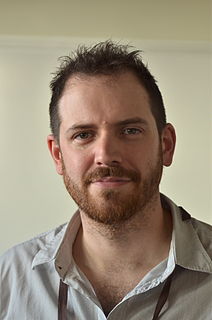A Quote by John Angell James
Luck, if it mean nothing more than an event of which the cause is not apparent, is a term that may be employed without error; but if it means, as it generally does, an event which has no cause at all, a mere chance, it is a bad word, a heathen term; drop it from your vocabulary; trust nothing to luck, nor expect anything from it; avoid all practical use or dependence upon this or its kindred words, fate, chance, fortune.
Related Quotes
Has God decreed all things that come to pass? Then there is nothing that falls out by chance, nor are we to ascribe what we meet with either to good or ill luck and fortune. There are many events in the world which men look upon as mere accidents, yet all these come by the counsel and appointment of Heaven.
It is strictly and philosophically true in Nature and reason that there is no such thing as chance or accident; it being evident that these words do not signify anything really existing, anything that is truly an agent or the cause of any event; but they signify merely men's ignorance of the real an immediate cause.
In a universe governed by God there are no chance events. Indeed, there is no such thing as chance. Chance does not exist. It is merely a word we use to describe mathematical possibilities. But chance itself has no power because it has no being. Chance is not an entity that can influence reality. Chance is not a thing. It is nothing.
Every event has a cause-that is ... for every event e1 there exists an event e2 (or a class of events e2, e3 ...) which precedes e1 and of which e1 is a necessary consequence.... If we assent to this statement then your "choice" to do A rather than B, whatever may have been at the time your sensation of freedom from any constraint, was entirely necessitated. You could not have done otherwise and hence, according to this conception of freedom, were not free.
This is what writers mean when they say that the notion of cause involves the idea of necessity. If there be any meaning which confessedly belongs to the term necessity, it is unconditionalness. That which is necessary, that which must be, means that which will be, whatever supposition we may make in regard to all other things.
There is nothing in the nature of a miracle that should render it incredible:;: its credibility depends upon the nature of the evidence by which it is supported. An event of extreme probability will not necessarily command our belief unless upon a sufficiency of proof; and so an event which we may regard as highly improbable may command our belief if it is sustained by sufficient evidence. So that the credibility or incredibility of an event does not rest upon the nature of the event itself, but depends upon the nature and sufficiency of the proof which sustains it.
It follows that the word probability, in its mathematical acceptance, has reference to the state of our knowledge of the circumstances under which an event may happen or fail. With the degree of information we possess concerning the circumstances of an event, the reason we have to think that it will occur, or, to use a single term, our expectation of it will vary. Probability is the expectation founded upon partial knowledge.
When it was suggested to Pasteur that many of his great achievements depended on luck, he replied - I'm sure with more than a little irritation - 'In the field of observation in science, fortune only favours the prepared mind.' It is not by chance that it is always the great scientists who have the luck.






































